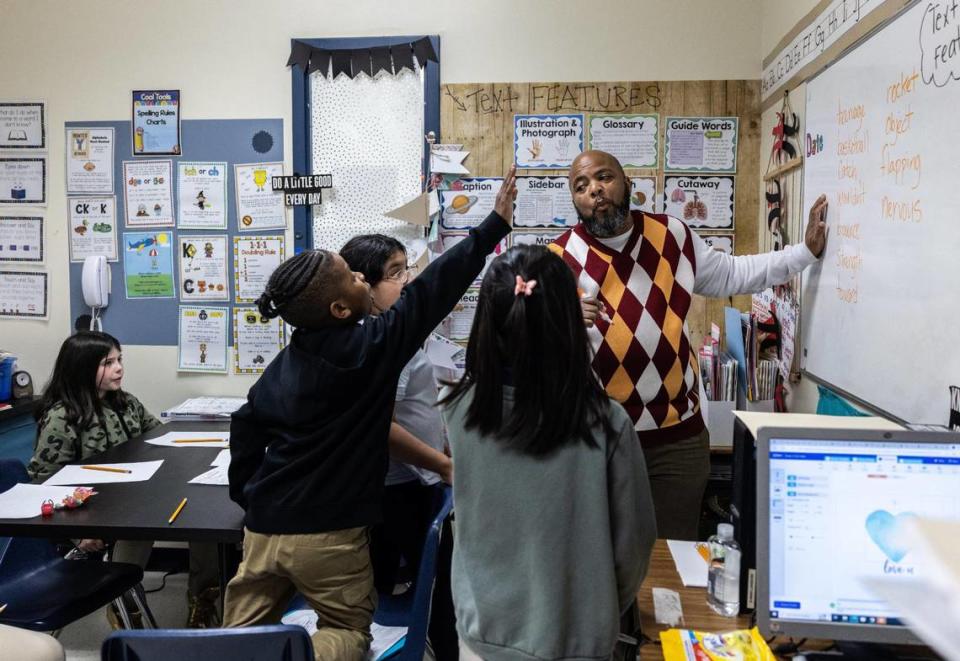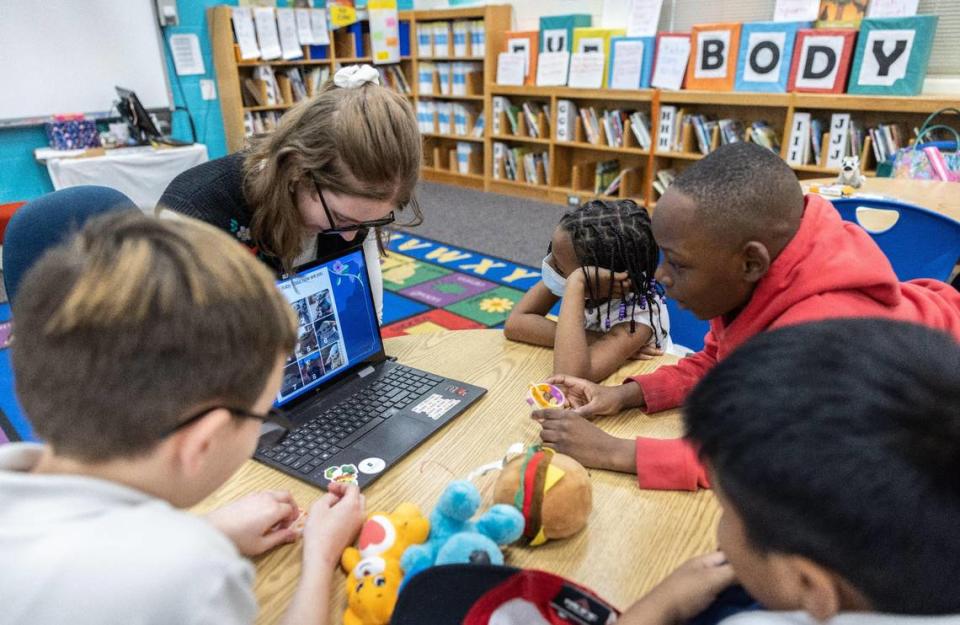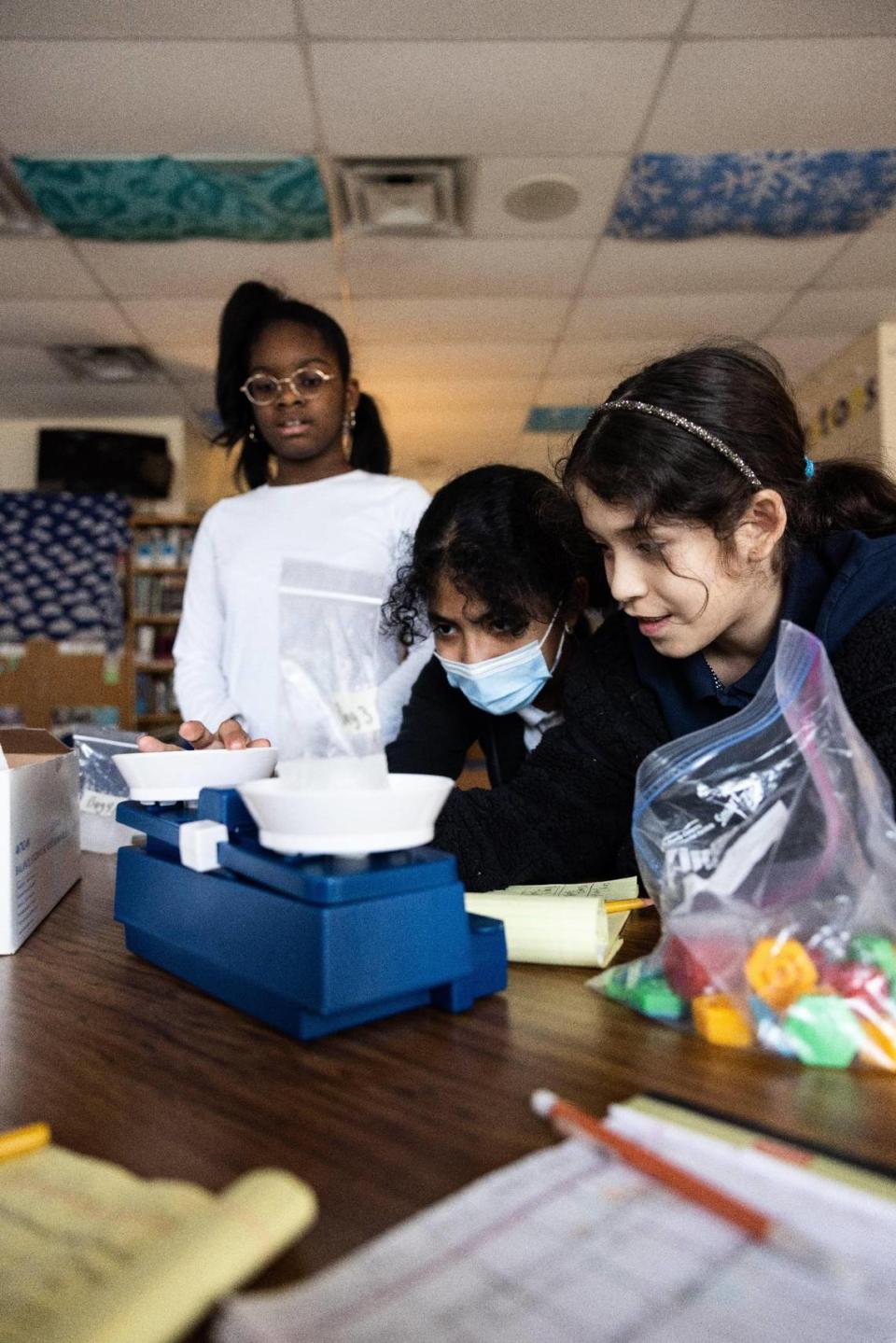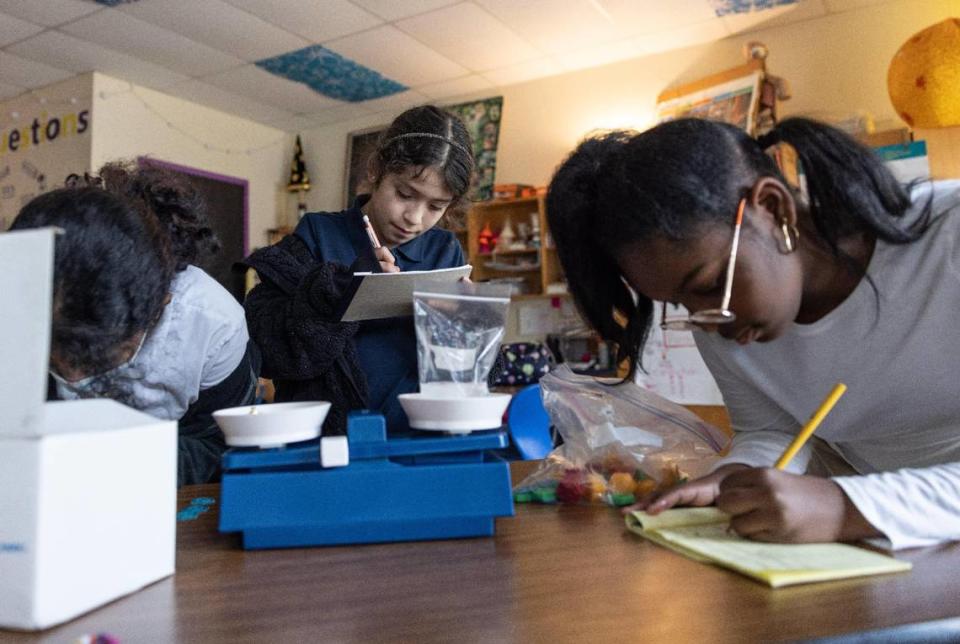‘Keeps me up at night.’ How will CMS pay for programs with dwindling COVID relief money?
Charlotte-Mecklenburg Schools’ windfall of more than a half-billion in federal money to help recover from the COVID-19 pandemic is coming to an end. And it’s unclear how the district will sustain programs created to help thousands of students still struggling to catch up.
The pandemic left students across Mecklenburg County more than a year behind in core subjects such as math and failing state exams. State test results and district analyses show high need students were hit the hardest. But federal aid funded CMS programs to help those students catch up.
CMS provided students with additional learning time and opportunities, made investments in staffing, curriculum, increased social and emotional help for students, and deployed tutors to help students in some of CMS’ lowest performing schools.
That includes people like Ariel Spencer, who works about six hours a week at Joseph W. Grier Academy tutoring second- and third-grade students in literacy, English, reading and writing.

“Even though the pandemic was awful, it really taught us how to take care of our mental health and really support students,” Spencer told The Charlotte Observer. “They’re dealing with it as we’re dealing with it. We have to be really patient.”
But the government inserted a stipulation in providing hundreds of millions to districts such as CMS — the “period of availability” ends Sept. 30, 2024, meaning all money must be encumbered or spent by that date. About $142.2 million also must be encumbered or spent by this September.
“That’s part of a fiscal cliff that makes me nervous,” CMS board chair Elyse Dashew said during a budget workshop last month. “It also keeps me up at night — the impact from COVID, the academic and social-emotional impacts our students are going through. It’s going to take a number of years to recover. Our kids will still be recovering when the (COVID relief) funds expire.”
VOTE NOW: Who's your superhero in K-12 education?
$542.1 million in COVID money

In 2020 and 2021, Congress passed three COVID relief packages that included more than $190 billion for public and private schools.
CMS received $542.1 million from those three packages — 52% of that has been spent; 17% is already is attached to a contract or purchase order; 26% is planned according to district priorities and 5% remains unbudgeted, said Katie Sunseri, executive director of CMS federal programs department.
The COVID relief money the district has already spent is faster than the national average of 45%. In North Carolina, the Wake County Public School System has spent 72%, and Union County Public Schools has spent about 78%, according to data provided from the North Carolina Department of Public Instruction. The state average of spending for public school districts is about 66%, according to NCDPI.
The influx of federal money continues to transform CMS’ ways of operating and addressing students’ learning needs head-on,” Sunseri said. In the current school year, federal money accounts for 26% of the district’s operating budget, roughly twice what it was before COVID. County and state money cover about 73% of the budget.
“We have to plan against the timeline to avoid setting ourselves up for a funding cliff,” Sunseri said.
How is CMS spending COVID money?
CMS is using more than $200 million in COVID relief to help students recover from learning lost during the pandemic. Nearly 3,500 students received one-on-one or small-group tutoring after school in the fall, and more than 3,200 students participated in multiple summer programs in 2022 that targeted specific grade levels, subjects and students.
Reading camps, for example, led to the district’s average reading percentile growing by four percentage points from spring 2022 to the fall, according to CMS data. Millions of dollars also have been spent on a new high school math curriculum so multiple levels of the subject offer rigorous coursework.
The district also earmarked $160 million for initiatives that include mental health services for students, retention bonuses for 18,000 employees and hiring 461 guest teachers who are not required to be licensed teachers but support schools when there are vacancies and absences.

Sunseri says CMS hired 63 counselors, social workers and psychologists with federal aid, which she said led to more contact with students and lower caseloads for employees. CMS says the new employees provided 1,500 therapy sessions for 290 uninsured or underinsured students since last summer.
COVID relief-funded initiatives also include providing translation services to help schools communicate with families who don’t speak English and contracting nurses who provided coverage to 40 schools that otherwise wouldn’t have a nurse.
How do any or all of the programs continue? Frank Barnes, CMS chief accountability officer, says the district is working on it.
“We are monitoring progress on key initiatives, and will be working to develop strategies to sustain those investments that are essential for our students’ successful pandemic recovery,” Barnes said.
CMS begins advocating for funding
In the last year before all COVID relief expires, 2023-2024, CMS will propose a slew of new investments along with keeping ones that have worked: tutoring, summer programs, student mental health services and guest teachers.
New investments include street teams that will focus on chronic absenteeism, teachers and guest teachers for multilingual students and translation services for multilingual students to receive help from counselors, social workers and mental health professionals.
Jennifer De La Jara, a school board member, calls the aid from the federal government unprecedented because it has allowed CMS to hire more college and career coaches, social workers, psychologists, and interventionists to assist students during the recovery from the pandemic.
But spending money in human resources, she told the Observer, is what concerns her the most when looking ahead to when that money is gone.
“Some purchases like for technology and air optimization were one-time investments,” De La Jara said. “The investments in human resources have had a huge impact, particularly with initiatives like our Guest Teacher program which has helped stabilize school environments. I’m concerned about the loss of consistency now that we have gained momentum coming out of this phase of the pandemic.”
For starters, De La Jara and fellow board members visited politicians in Washington, D.C. last month to request the use of COVID relief be extended beyond September 2024 so CMS can retain the staff, services and programs it spent relief money on.

She said officials will make the case why Mecklenburg County students deserve more investment from the county and city, particularly after COVID’s impact on learning.
“The state or Mecklenburg County could step in to help us retain some of these valuable resources we have been able to invest in,” De La Jara said. “Seeing that North Carolina is ranked 50th/50 in public school investment and Mecklenburg County is ranked 81/100, there is definitely room for increased investment from both of those resources.”
Dena Diorio, Mecklenburg County manager, told the Observer that CMS is an ”important and valued partner,” but would not elaborate when asked whether the county could allocate more money to offset what the district will lose in COVID dollars.
For the 2022-23 year, the county approved $558 million to CMS for its operating budget — about 26% of the district’s total. That does not include money for capital projects.
The district isn’t certain how it will pay for ongoing costs paid for with COVID relief because officials are still figuring out which initiatives they should keep.
“It is so important (to figure out) what is effective,” Dashew said, “to make that case for investment to our local and state funders.”
College dean: CMS must rely on community partners
Emily Elliott Gaffney is the chief executive officer of Heart Math Tutoring in Charlotte. The team of one-on-one, volunteer tutors has been involved with CMS since 2013 and it saw the social isolation students experienced during the pandemic and helped them feel comfortable and cared for in school when in-person learning returned, Gaffney said.
Gaffney, like other experts, says keeping students learning despite any future disruptions means schools must deepen their investment in the community and its resources.
“I would hope that (our) structures we put in place would help prevent a lot of the issues the community faced initially,” Gaffney said. “I hope that our communities, schools, and families will all work in partnership to best support our students’ continued development.”
Malcolm Butler, dean of the Cato College of Education at the University of North Carolina Charlotte, taught math and science through all levels of education — elementary school through college. Now is the time for institutions such as CMS and UNC Charlotte to be “laser-focused” on its partnerships.
“We can’t do this alone,” Butler told the Observer. “We are truly in this together. ... Everybody says this is a new normal. But do we really know what that is just yet?”
Spencer believes a continued recovery also starts at home, particularly with navigating learning.
“Really try and listen to your kids and build that relationship,” Spencer said. “Tell them, ‘it’s OK, I understand, this is a lot for you.’ It’s a lot for me, too. Let’s try and do it together. That’s what keeps them engaged.”

